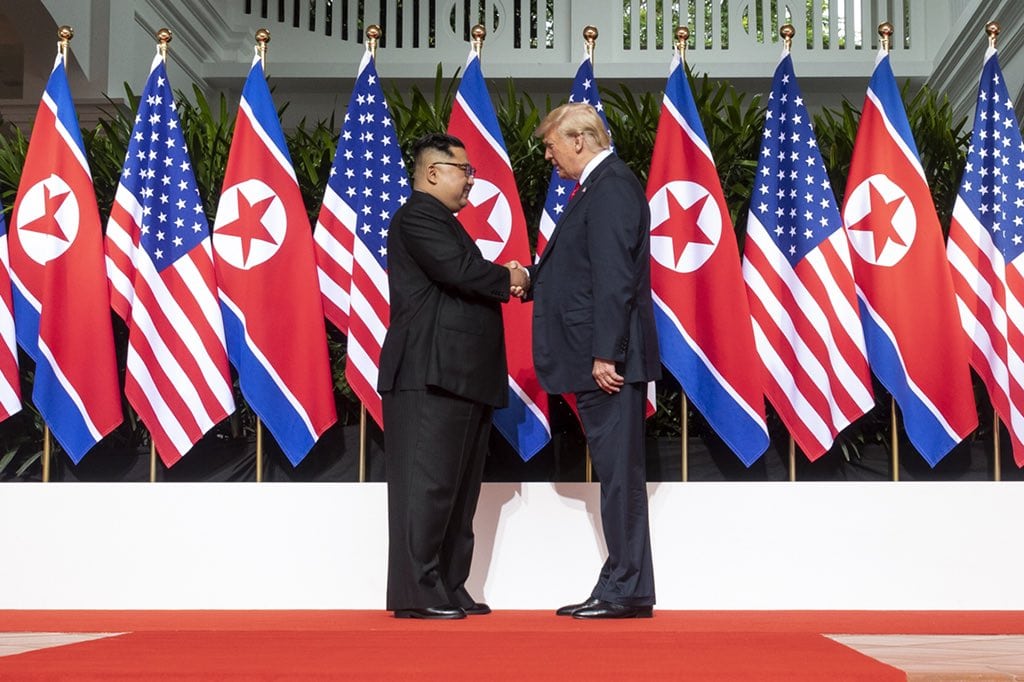 White House photo
White House photo
Where we Stand with North Korea after the Trump-Kim Summit
President Trump’s meeting with Kim Jong Un this week was a moment for the history books. What that history will be has not yet panned out. We are certainly seeing a change in rhetoric from both the Trump Administration and the North Korean Government, and that is a positive step. But in the case of high stakes nuclear diplomacy, rhetoric doesn’t matter as much as action. This morning, President Trump declared on twitter that North Korea no longer posed a nuclear threat:
Before taking office people were assuming that we were going to War with North Korea. President Obama said that North Korea was our biggest and most dangerous problem. No longer – sleep well tonight!
— Donald J. Trump (@realDonaldTrump) June 13, 2018
As North Korea still possesses nuclear weapons and the means to deliver them, the president’s statement is premature and simply untrue. In comparison to Iran, the president has now painted a completely opposite picture of the threat, despite there being no Iranian nuclear weapons thanks to a deal the president has torn up. Though Iran is responsible for a lot of the violence and chaos in the Middle East, it simply does not have the means to strike with the same amount of destructive capability as North Korea. We mustn’t forget that like Iran, North Korea has its own record of hostile actions, including sinking a South Korean naval ship, conducting unprovoked artillery barrages, kidnapping its neighbors’ citizens, imprisoning American citizens, and hacking American industries.
To actually achieve our goals, we must consider the North Korean perspective on why it needed nuclear weapons in the first place: self-reliance, international recognition, and regime preservation. If the Kim regime chooses to surrender these weapons, the U.S. and the international community must provide an alternative that helps satisfy the North Korean perspective. Understanding this, President Trump’s seemingly absurd praise of Kim may be serving as confidence-building measure providing him with some of the assurance he feels he needs.
Considering the Kim regime’s primary goal is its own survival, the president’s suddenly effusive praise towards Kim may be a necessary component for North Korean buy-in. After recent administration gaffes comparing the potential of North Korea to be modeled after Libya’s denuclearization, this praise can help serve as a verbal assurance that the North Korean regime will be “safe” (both from internal and external threats) after giving up its nuclear deterrent.
If the primary goal of U.S. policy towards North Korea is complete (and hopefully verifiable) denuclearization, attaching other goals to this agreement may render a final deal unreachable, as was the case with the Iran Deal. But this administration has heavily criticized the Iran Deal for not solving every problem with Iran. At the time, the Obama administration determined that the nuclear weapons threat was so severe that it needed to be prioritized on its own above all other considerations. Trying to resolve Iranian human rights, ballistic missiles, involvement in Syria, interference in Iraq, and support for terror groups were viewed as secondary issues in comparison to the threat posed by a potential Iranian nuclear weapon. North Korea already has nuclear weapons.
After this summit, the hard work begins, because so far nothing tangible has actually been accomplished. North Korea merely re-affirmed the Panmunjom Declaration it signed with South Korea in April. Arranging a bilateral summit was easy: it was a concession that the North Koreans have wanted for ages, and any previous U.S. President could have facilitated that. Now, more diplomatic meetings must be held, an inspections regime must be created, a system and timeline for dismantling North Koreas nuclear arsenal must be decided upon, sanctions relief must occur. North Korea likely wants major concessions with regards to the U.S.-South Korea alliance. The order in which these things occur will be critical, and given that North Korea is much more capable in the nuclear realm than Iran ever was, it will be harder. Based on past experiences with the country, even a signed guarantee that things will happen is no guarantee they will happen. It’s one thing to agree in principle, it’s another to agree in bullet-proof writing and implementation.
A formal formal treaty, or series of treaties, will be necessary this time around, meaning Congress must be involved. Any agreement with North Korea will need congressional support to survive. The lack of congressional buy-in is one reason the Iran Deal was so easily discarded. If a deal with North Korea is to be successful, it will not only need Congress’ initial support, but its continued support for its provisions, requirements, and obligations from both sides in the long term. And while it’s likely there will be things in the agreement that aren’t ideal, that’s part of this process—neither side gets everything they want, but both sides have to get enough to outweigh the risks or benefits of the alternative.





